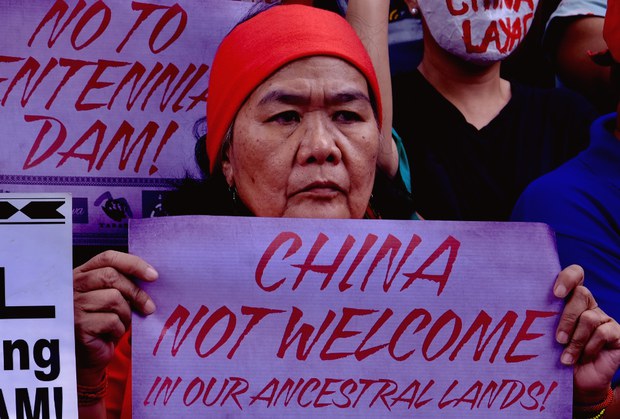Philippine, Chinese Foreign Secretaries Meet after US Warning on South China Sea
2020.07.15
Manila
 A woman who is carrying a sign rejecting Chinese incursions into Philippine territories in the South China Sea joins other protesters outside the Chinese Consulate in Metro Manila, Nov. 20, 2018.
A woman who is carrying a sign rejecting Chinese incursions into Philippine territories in the South China Sea joins other protesters outside the Chinese Consulate in Metro Manila, Nov. 20, 2018.
Philippine Foreign Secretary Teodoro Locsin Jr. and Chinese counterpart Wang Yi met this week to talk about managing territorial disputes in the South China Sea, a day after a stern warning from the United States.
The virtual meeting took place on Tuesday at Wang’s request, the Philippine Department of Foreign Affairs said Wednesday, adding that both men “engaged in open, cordial and fruitful discussions” that centered on the conflict in the maritime region.
“Secretary Locsin reiterated the importance of continued dialogue to propel Philippines-China cooperation forward across various fronts, under the ‘new normal’ brought about by the global COVID-19 pandemic,” the department said.
“The two foreign ministers recognized that Philippines-China bilateral relations have achieved a positive turn around and a sound momentum of development through joint efforts and mutual trust of both sides,” it said.
Locsin and Wang agreed that the “contentious maritime issues” did not make up the totality of bilateral relations.
“With mutual respect, sincerity and adherence to sovereign equality, both sides will continue to manage issues of concern and promote maritime cooperation in friendly consultation,” the Philippine statement read.
The top Chinese and Philippine diplomats met after U.S. Secretary of State Mike Pompeo stated that Beijing’s claim over rocks and reefs in the Spratly Islands, a chain in the South China Sea, was unlawful, and its maritime claims based off alleged ownership of those features was in clear violation of international law.
In his statement issued on Monday, Pompeo cited China’s insistence on holding economic rights to waters around Scarborough Reef, Mischief Reef, and Second Thomas Shoal, all of which are claimed by the Philippines.
Apart from the Philippines and China, Malaysia, Brunei, Vietnam and Taiwan also have overlapping claims in the Spratlys.
“Any PRC action to harass other states’ fishing or hydrocarbon development in these waters – or to carry out such activities unilaterally – is unlawful,” Pompeo said, referring to the People’s Republic of China.
Chinese response
During his meeting with Locsin, Wang called the South China Sea situation stable, thanks to Beijing’s efforts with Association of Southeast Asian Nations (ASEAN), according to a statement from China’s Ministry of Foreign Affairs on Tuesday.
“However, driven by its geopolitical agenda, the United States does not want to see peace in the South China Sea and has been stoking instability by sending the most advanced vessels and aircraft to flex muscles and scaling up militarization in the region. Such dangerous moves deserve high alert from regional countries,” Wang said, according to the statement.
Two days before Locsin met with his Chinese counterpart, he issued a statement commemorating the fourth anniversary of the July 12, 2016, ruling of the United Nations-backed Permanent Court of Arbitration in The Hague. Locsin said the Philippines had clearly won the ruling and that the contested area was indeed under its ownership. He called on China to comply with the court’s decision.
Following a standoff between the navies of the Philippines and China over Scarborough Shoal, the court ruled in favor of Manila and struck down the legal basis of Beijing’s vast claims in the sea region. The shoal is a traditional fishing ground west of the Philippines’ main island of Luzon and is closer to the Southeast Asian country than the nearest Chinese landmass.
Instead of enforcing the ruling, President Rodrigo Duterte, who took office on June 30, 2016, sought to appease Beijing and to repair bilateral ties.
On Wednesday, Duterte spokesman Harry Roque said the government continued to assert the country’s sovereign rights in the West Philippine Sea, the name Filipinos use for the South China Sea.
“We have not waived nor have we relinquished these rights. Unfortunately, the Permanent Court of Arbitration ruling has no way of being enforced by the body which rendered it, so we must look to other means to resolve the dispute,” he said.







